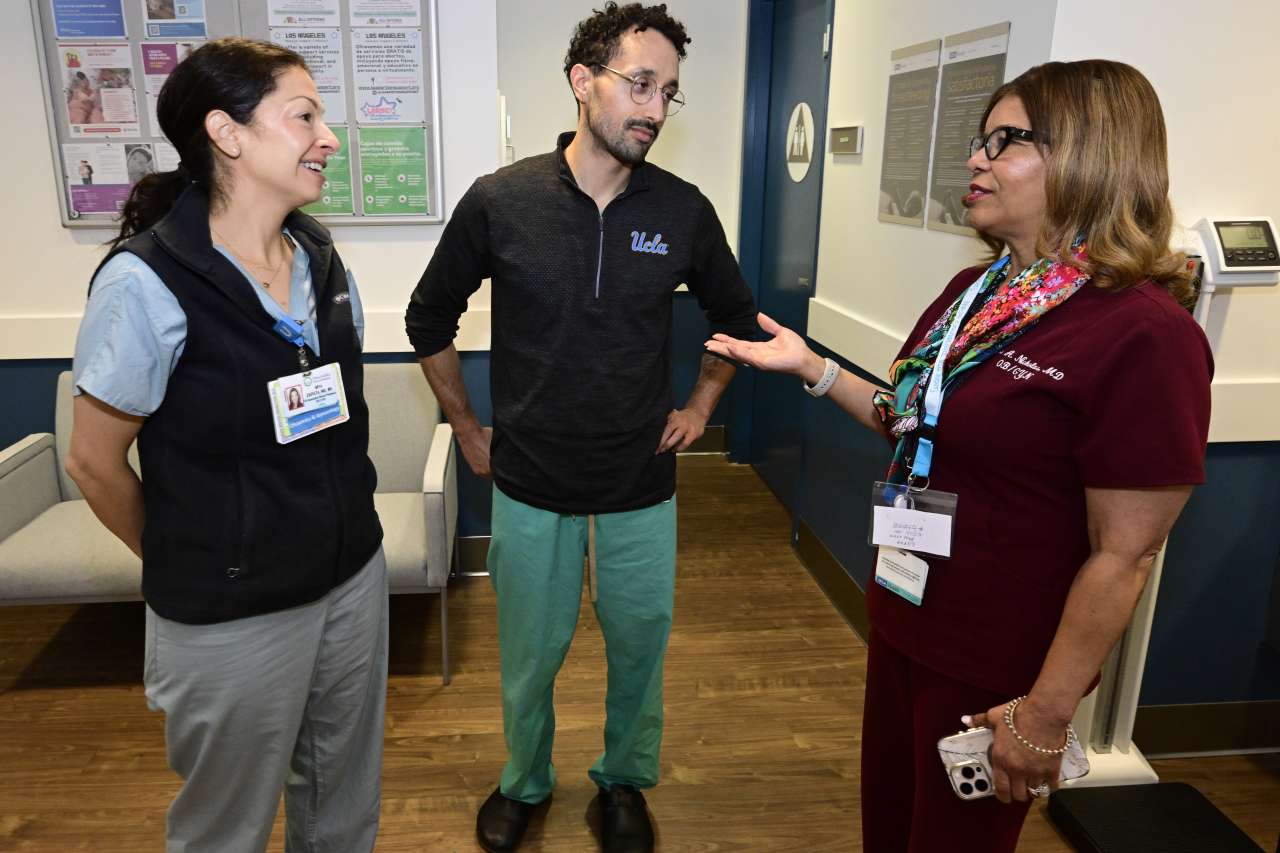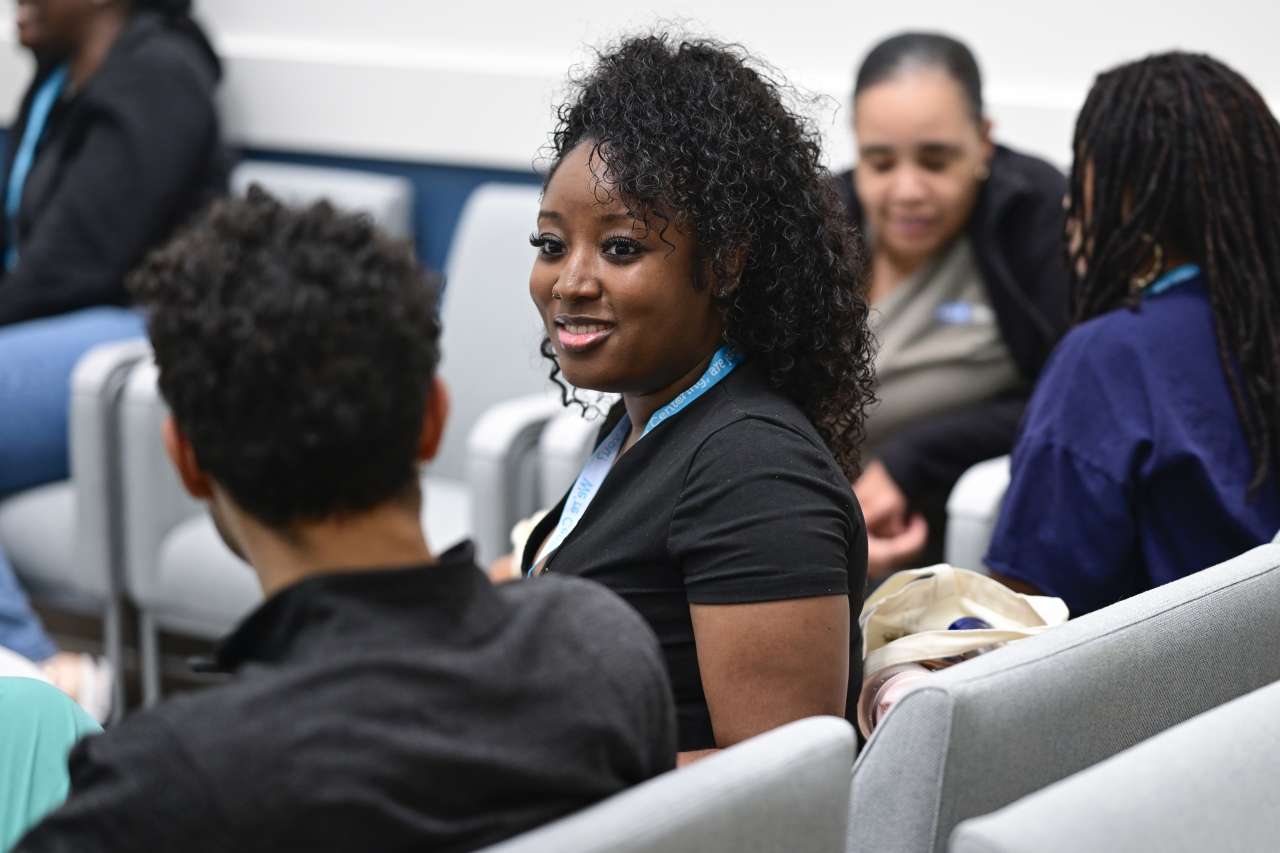MK Malone was apprehensive about her pregnancy. She had failed her first glucose test and had a friend who lost her baby at 20 weeks.
“It was scary,” she said.
But what helped Malone, who now has a healthy 4-month-old daughter, was a program at UCLA Obstetrics and Gynecology called CenteringPregnancy. It takes pregnant people out of exam rooms and puts them into groups for their prenatal care where they are with other expectant parents at the same stage of their pregnancy journey.
Opportunities to learn and engage
Malone, who was at 12 weeks during her first CenteringPregnancy appointment, expected it was going to be an experience similar to a birthing class. But, she said, it was so much more. She did not expect it to be a guided session of learning and engagement where group members could determine what they wanted to focus on or learn more about.
“I don’t have other friends who were going through a pregnancy at the time,” Malone said. “So, it was invaluable to have this group and to see what people were curious or scared of.”
It was also a safe environment where she felt confident and unapprehensive when it came to asking questions or sharing concerns.
“The most valuable thing I got out of it was learning not to be afraid to ask questions and advocate for myself, even if I don’t know exactly what I want,” she said. “For example, I could ask why someone would go on Pitocin (to induce labor). I could freely ask what that would do or feel like.”
What Malone got out of the program was exactly the vision that started CenteringPregnancy, said Mya Zapata, MD, an obstetrician-gynecologist. It began as a national movement in the 1990s when a nurse-midwife brought pregnant women together for their prenatal visits to provide more comprehensive care to her patients. There are now Centering programs in 45 states across the country.
Patients learn from each other
Dr. Zapata said UCLA Health recruited its first group of patients in October 2024. She said the program takes a holistic approach, which helps expectant parents build peer connections and get education in a format that is more approachable, allowing them to learn from each other.
“It’s different from traditional care where the pregnant person has brief visits with their health care provider,” Dr. Zapata said. “This can be an isolating experience, including postpartum.”
With the Centering approach, group members are between 12 and 16 weeks of pregnancy and get together for 10 visits. The first four visits happen every four weeks and the last six visits are every two weeks until birth. The group also has a reunion or celebration so group members can bring their babies and have an opportunity to meet others’ children.

Dr. Zapata says one of the big benefits of Centering groups is that they facilitate discussion, where people have the opportunity to share as much or as little as they want.
“Some might like to hear and learn, but may feel more reserved to share personal information,” she said. “But they don’t have to.”
Phones are not used during the visit, which lasts two hours. During that period, the person has one-on-one time with a health care provider. Patients are also taught to do a self-assessment so they are “aware of what’s happening in their own bodies,” Dr. Zapata said.
“They check their weight, blood pressure, oxygen saturation and pulse,” she said. “They record in a journal documenting their CenteringPregnancy journey. It’s a time for reflection and understanding.”
The group intentionally has patients who are a few weeks ahead of others so those who are ahead can help guide others as to what they can expect in the coming days and weeks. A number of patients find this type of guidance invaluable, Dr. Zapata said.
Pregnant people want rich discussions
The CenteringPregnancy curriculum includes a host of relevant topics – from stress management, breast feeding, the birthing process and postpartum planning to what to know about postpartum depression, how to choose a pediatrician, navigating relationships and handling a return to work. Dr. Zapata said UCLA Health’s multidisciplinary approach shines through in this program, as well, with access to numerous providers who lend their expertise to the group.
Dr. Zapata said she was initially unsure that patients would not want to spend that much time in a group, but she was left pleasantly surprised.
“I saw how patients wanted to keep the dialogue going and had such rich discussions,” she said. “I could see how relevant and helpful it was to them. The biggest satisfaction for me was to see participants’ surprise at how rich this interaction with health care providers can be. It was heartening to get a comment from a patient that they had never experienced health care like this before. That was so gratifying to hear because traditional health care can feel more transactional at times.”
Nastaran Sajedi, who is now mother to a 4-month-old boy, said she was apprehensive about her pregnancy because she had conceived via in-vitro fertilization (IVF).
“Because of my age and situation, I was worried it might fail,” she said. “But being a part of this group made me feel safe and supported. It motivated me to keep going. I understood that every parent has the same fears and feelings about their children and that I was not alone.”
A pathway for diversity and inclusion
In March 2025, the CenteringPregnancy program saw its first group of Black pregnant patients. Centering Black Pregnancy is important because it helps “these patients be seen, heard and understood,” Dr. Zapata said.
Lisa Nicholas, MD, a vice chair of the UCLA Department of Obstetrics and Gynecology, said Centering Black Pregnancy addresses not only patients’ clinical needs, but also the social determinants of health, and builds a strong bond of trust and empowerment for participants.
“We look at disparities known to occur for Black women, including when it comes to pre-term birth and lack of resources for breastfeeding,” she said. “Our goal with this program is to build trust and empowerment, improve outcomes, help with stress management, housing and food insecurity and just being able to facilitate discussions in a safe and open forum. This can help reduce isolation and prepare them to embrace a positive experience.”

Dr. Nicholas said having this cohort of Black women is important because it is a group that is at higher risk for complications and mortality.
“When we focus on those who are the most deeply afflicted, it elevates the standard of care for everyone,” she said. “Nobody will lose, and everybody will gain.”
Dr. Zapata said a pilot program for those going through menopause also was recently launched and successfully completed 10 sessions.
Centering sessions are covered by health insurance just as prenatal visits are, she said.
“I’d like to see it be available at multiple sites,” Dr. Zapata said. “I feel that patients in these groups have developed much deeper connections with their health care providers than they would in a traditional setting. They’ve gotten a lot of questions answered and they just seem so ready.”





